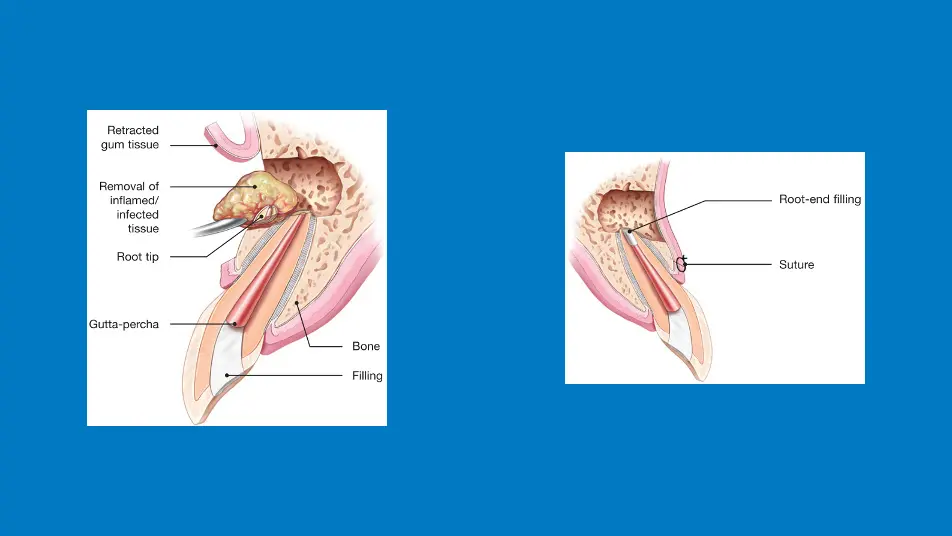Endodontic Surgery
Advanced technologies allow quick, comfortable and successful surgery.
Occasionally, a nonsurgical root canal procedure alone cannot save your tooth and your endodontist will recommend surgery. Endodontic surgery can be used to locate small fractures or hidden canals that weren’t detected on x-rays or during previous treatment. Surgery may also be needed to remove calcium deposits in root canals, or to treat damaged root surfaces or the surrounding bone of the tooth.
There are many surgical procedures that can be performed to save a tooth. The most common is called an apicoectomy, or root-end resection, which is occasionally needed when inflammation or infection persists in the bony area around the end of your tooth after a root canal procedure. In this microsurgical procedure, the endodontist opens the gum tissue near the tooth to see the underlying bone and to remove any inflamed or infected tissue. The very end of the root is also removed. A small filling may be placed to seal the end of the root canal and few stitches or sutures are placed to help the tissue heal. Over a period of months, the bone heals around the end of the root. Local anesthetics make the procedure comfortable, and most patients return to their normal activities the next day. Postsurgical discomfort is generally mild.
Are there other types of endodontic surgery?
Other surgeries we might perform include dividing a tooth in half, repairing an injured root, or even removing one or more roots. Dr. Lovetto will be happy to discuss the specific type of surgery your tooth requires.
In certain cases, a procedure called intentional replantation may be performed. In this procedure, a tooth is extracted, treated with an endodontic procedure while it is out of the mouth, and then replaced in its socket.
These procedures are designed to help you save your tooth.
Will the procedure hurt?
Local anesthetics make the procedure comfortable. Of course, you may feel some discomfort or experience slight swelling while the incision heals. This is normal for any surgical procedure. If needed, we will recommend appropriate pain medication to alleviate your discomfort.
After your procedure, we will give you specific postoperative instructions to follow. If you have questions after your procedure, or if you have pain that does not respond to medication, call us immediately.
Can I drive myself home?
Often you can, but ask our staff before your appointment so that you can make transportation arrangements if necessary.
When can I return to my normal activities?
Most patients return to work or other routine activities the next day. If there will be longer recovery time, one of our team will be happy to discuss what you can expect.
How do I know the surgery will be successful?
Endodontic surgery is recommended because we believe it is the best option for saving your own natural tooth. Of course, there are no guarantees with any surgical procedure, and we will discuss your chances for success so that you can make an informed decision.
What are the alternatives to endodontic surgery?
Often, the only alternative to surgery is extraction of the tooth. The extracted tooth must then be replaced with an implant, bridge, or removable partial denture to restore chewing function and to prevent adjacent teeth from shifting. Because these alternatives require surgery or dental procedures on adjacent healthy teeth, endodontic surgery is usually the most biologic and cost-effective option for maintaining your oral health.
No matter how effective modern artificial tooth replacements are—and they can be very effective—nothing is as good as a natural tooth. You’ve already made an investment in saving your tooth. The pay-off for choosing endodontic surgery could be a healthy, functioning natural tooth for the rest of your life.

NAPLES, FL • SEND US AN EMAIL • (239) 261-3017
© Associates in Endodontics. All Rights Reserved • Web Design by Studio Haideux
